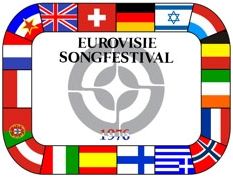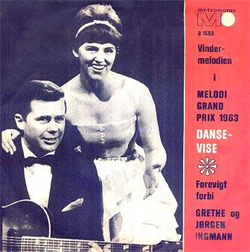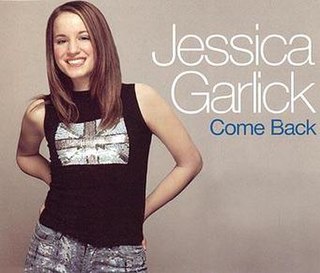
The Eurovision Song Contest 1989 was the 34th edition of the annual Eurovision Song Contest. It took place in Lausanne, Switzerland, following Céline Dion's victory at the 1988 contest with the song "Ne partez pas sans moi". Organised by the European Broadcasting Union (EBU) and host broadcaster Swiss Broadcasting Corporation, the contest was held at Palais de Beaulieu on 6 May 1989 and was hosted by Swiss model Lolita Morena and journalist Jacques Deschenaux.

The Eurovision Song Contest 1988 was the 33rd edition of the annual Eurovision Song Contest. It took place in Dublin, Ireland, following Johnny Logan's win at the 1987 contest with the song "Hold Me Now". Organised by the European Broadcasting Union (EBU) and host broadcaster Radio Telefís Éireann (RTÉ), the contest was held at the RDS Simmonscourt on 30 April 1988 and was hosted by Irish broadcaster Pat Kenny and the Miss Ireland 1980 Michelle Rocca, marking the first time since the 1979 contest that two presenters had hosted the contest.

The Eurovision Song Contest 1976 was the 21st edition of the annual Eurovision Song Contest. It took place in The Hague, Netherlands, following the country's victory at the 1975 contest with the song "Ding-a-dong" by Teach-In. Organised by the European Broadcasting Union (EBU) and host broadcaster Nederlandse Omroep Stichting (NOS), the contest was held at the Nederlands Congrescentrum on 3 April 1976 and was hosted by 1957 Dutch Eurovision winner Corry Brokken.
Live Report represented the United Kingdom in the Eurovision Song Contest 1989 with the song "Why Do I Always Get It Wrong", which placed 2nd in Lausanne, Switzerland.
The United Kingdom selected their entry for the Eurovision Song Contest 1996 in Oslo, Norway with a new show, The Great British Song Contest. The winning entry was Gina G with "Ooh Aah... Just a Little Bit".
The United Kingdom competed in the Eurovision Song Contest 1998. In addition, the British Broadcasting Corporation (BBC) was also the host broadcaster and staged the event at the National Indoor Arena in Birmingham on 9 May 1998 after the nation won the competition in 1997 with the song "Love Shine a Light" performed by Katrina and the Waves. The BBC organised a public selection to select its entry for the contest, The Great British Song Contest 1998. Eight songs competed over two rounds, with four songs selected through a radio-broadcast semi-final advancing to the televised final round, held on 15 March 1998, where viewers selected the winning entry through televoting. Imaani received the most votes and was selected to represent the UK in the contest with the song "Where Are You?". Imaani performed 16th at the international contest, and at the close of the voting process the UK finished in second place with 166 points, the nation's 15th second-place finish since its debut.

"Love Shine a Light" is a song by British rock band Katrina and the Waves. It represented the United Kingdom at the Eurovision Song Contest in 1997. It was released as a single on 28 April 1997 and was later included on the band's ninth studio album, Walk on Water (1997), serving as the album's lead single.

Eurovision: You Decide is the most recent name of a BBC television programme that was broadcast annually to select the United Kingdom's entry for the Eurovision Song Contest. The show had previously gone under several other names, including Festival of British Popular Songs (1957), Eurovision Song Contest British Final (1959–1960), The Great British Song Contest (1996–1999), Eurovision: Making Your Mind Up (2004–2007), Eurovision: Your Decision (2008), and Eurovision: Your Country Needs You (2009–2010), but was known, for most of its history, as A Song for Europe.

The Eurovision Song Contest was first held in 1956, originally conceived as an experiment in transnational television broadcasting. Following a series of exchange broadcasts in 1954, the European Broadcasting Union (EBU) commissioned an international song competition, from an idea developed by Sergio Pugliese and Marcel Bezençon and originally based on the Italian Sanremo Music Festival.

"Dansevise" was the winning song of the Eurovision Song Contest 1963, which took place on 23 March in London. It was performed in Danish by husband and wife duo Grethe and Jørgen Ingmann, representing Denmark. This was the first entry performed by a duo to win the contest and also the first Scandinavian win.
Germany participated in the Eurovision Song Contest 2004 with the song "Can't Wait Until Tonight" written by Stefan Raab. The song was performed by Max. Songwriter Stefan Raab represented Germany in the Eurovision Song Contest 2000 with the song "Wadde hadde dudde da?" where he placed fifth in the competition. The German entry for the 2004 contest in Istanbul, Turkey was selected through the national final Germany 12 Points!, organised by the German broadcaster ARD in collaboration with Norddeutscher Rundfunk (NDR). The national final took place on 19 March 2004 and featured ten competing acts with the winner being selected through two rounds of public televoting. "Can't Wait Until Tonight" performed by Max was selected as the German entry for Istanbul after placing first in the top two during the first round of voting and ultimately gaining 853,688 votes in the second round.
Live Report, originally called Midnight Blue, composed of Ray Caruana (vocals), John Beeby, Brian Hodgson, Maggie Jay, Mike Bell (keyboards) and Peter May. Brian Hodgson was a musician, producer and composer and former member of the UK pop group Matchbox, writing many of their 8 hits in the UK.

"Come Back" is a single released by Welsh pop singer Jessica Garlick which was the United Kingdom entry for 2002 Eurovision Song Contest.
Norway participated in and won the Eurovision Song Contest 2009 with the song "Fairytale" written and performed by Alexander Rybak. The Norwegian Broadcasting Corporation (NRK) organised the national final Melodi Grand Prix 2009 in order to select the Norwegian entry for the 2009 contest in Moscow, Russia. 21 entries competed in the national final that consisted of three semi-finals, a Last Chance round and a final. Eight entries ultimately qualified to compete in the final on 21 February 2009 where the winner was determined over two rounds of voting. In the first round of voting, a public televote exclusively selected the top four entries to advance to the competition's second round—the Gold Final. In the second round of voting, "Fairytale" performed by Alexander Rybak was selected as the winner following the combination of votes from four regional jury groups and a public televote.
"Love Is…", written and composed by James Kaleth and Vikki Watson, was the United Kingdom's entry at the Eurovision Song Contest 1985, performed by Watson, credited at Eurovision and on the single by just her given name.
"Go", written and composed by Julie Forsyth, was the United Kingdom's entry at the Eurovision Song Contest 1988, performed by Scott Fitzgerald. Bruce Forsyth and his wife were in the audience at the contest, supporting their daughter.
"Give a Little Love Back to the World", written and composed by Paul Curtis, was the United Kingdom's entry at the Eurovision Song Contest 1990, performed by Emma. At the age of 15, Emma was the youngest-ever entrant on behalf of the United Kingdom at Eurovision.

"One Step Out of Time", written and composed by Paul Davies, Tony Ryan, and Victor Stratton, was the United Kingdom's entry at the Eurovision Song Contest 1992, performed by Michael Ball.
West Germany was present at the Eurovision Song Contest 1989, held in Lausanne, Switzerland. This year marked the last Contest in which participation and televoting were only open to residents of West Germany. The winning entry was "Flieger", performed by Nino de Angelo and composed by Dieter Bohlen with lyrics by Joachim Horn-Bernges.

"Always" is a song by Azerbaijani singer Aysel Teymurzadeh and Swedish-Iranian singersongwriter Arash Labaf. It was the Azerbaijani entry to the Eurovision Song Contest 2009. The song was selected by Ictimai TV (İTV), the Azerbaijani broadcaster, among the 30 songs submitted to the broadcaster in an open call. The song was composed by a group of songwriters including Arash.









